Anxiety is a universal human experience. We all have experienced anxiety in one form or another. Some anxiety is integral to regular work and life. In a larger sense anxiety is a drive that makes sure we work towards safeguarding ourselves from danger.
Children experiencing distress in the absence of caregivers or in the presence of strangers and becoming soothed and joyful when reunited with caregivers is an excellent example of how anxiety governs our behaviour from early years. While some forms of stress are innate, many anxieties can also be learnt.

Based on our culture and childhood experiences, we learn to fear various situations (exams, public speaking, flying, heights etc.), individuals (teachers, police, clowns, etc.), Living beings (Dogs, snakes, spiders etc.) or Objects (needles, gas stoves etc.).
This can be a terrifyingly long list; instead, given the right circumstances, one may be conditioned to learn to fear almost anything. Hence anxiety is both a state that a person can be in or an integral part of how a person thinks. Dr. Avinash G. Kamat, Pediatrician, KMC Hospital, Mangalore, give us some insides into this problem.
Also Read: World Brain Tumor Day 2023: Empowering Minds, Inspiring Hope

Experience of anxiety in children and adults may manifest as combinations of -
1. Anxious thinking: worry, doubts, brooding about the past, preoccupation about right and wrong.
2. Unpleasant physical experience: Chest tightening, heart beating fast, increased and heavy breathing, headaches, stomachaches, frequent need to go to loo etc.
3. Anxious behaviours: Pacing, fainting, hair pulling, nail-biting, repeated behaviours like checking, washing. Excessive bathing, cleaning, praying and avoiding things that can cause or remind them of anxiety-provoking situations etc.

Preschoolers may demonstrate anxiety with protests, tantrums, or avoiding people or situations that cause stress. It is around 5 years when children learn to express their emotions; however, it takes up to 8 to 10 years to develop the emotional competence and the vocabulary to express their thoughts and label their anxiety. Hence younger children often experience physical distress while feeling anxious, resulting in multiple doctor visits to determine the cause. Among children with developmental problems like intellectual disorders or Autism, the expression of anxiety can be confusing as they may not have the skills to take help or verbally express these concerns.
Also Read: Are multivitamins not required at all? Know truth here
WHEN TO SEEK PROFESSIONAL HELP?
1. Too much or too long: A straightforward way to understand if anxiety is a problem is when the frequency and intensity of anxiety do not match the situation. In other words, is it too severe or too long since the symptoms have started? For instance, continued school refusal even after 6 months of starting schooling.
2. When the behaviours interfere with normal functioning: There are recurrent sleep, appetite, or natural rhythms changes. Children may, at times, behave like younger children or become clingy. In severe stress, children may suddenly lose control over movement, speech, or parts of memory. Sometimes children may again start bedwetting in response to severe anxiety. These symptoms may be dramatic and alarming for caregivers.
Also Read: Here are 7 home remedies to battle summer skin rashes
3. Decline in performance: Anxiety can cause a decline in children's functioning across areas like school performance, public speaking, or friendships. We also know this can sometimes lead children, especially teens to take steps like self-harm or substance use.
The message on this anxiety awareness day for parents is that anxiety is an essential part of our children’s lives which can sometimes interfere with their abilities. Children can overcome their anxieties and express themselves to their full potential when identified and managed early. And today, we have taken the first step by becoming aware of how anxiety is experienced and affects young lives.
